Part 2 of my interview with Emma and Ryan about having a relationship expectation talk early on
Continuation of my interview with Emma and Ryan (pseudonyms) about their new relationship conversations
Click here to read part 1 of the interview
Roy: I’m wanting to go back to you mentioning that relationship talk that you have agreed to on a time and a date. Can you share what did you cover there? What was it like?
Ryan: Emma prepared a list of questions beforehand.
Emma: I’ll see if I can find them. I’ve got them written down somewhere.
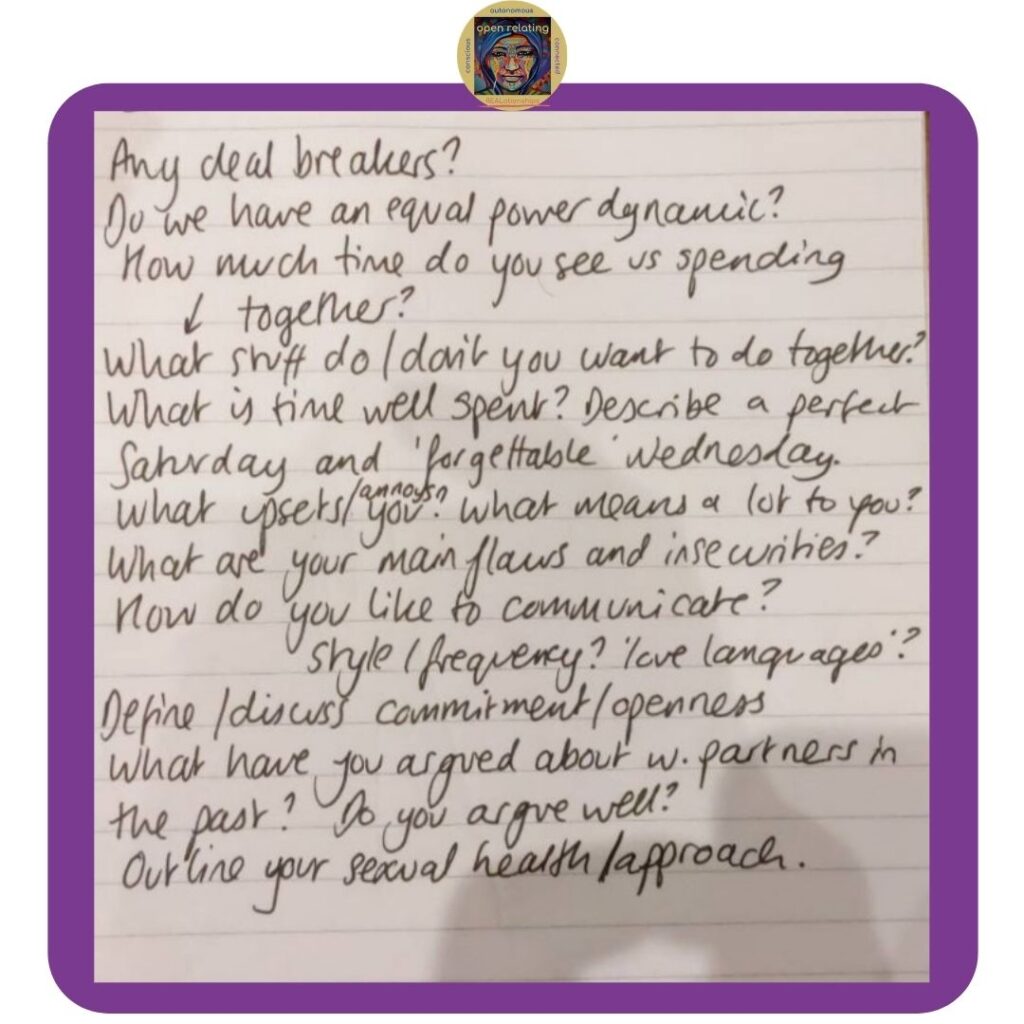
Ryan: Some of the questions were, about monogamy, polyamory, those kinds of things. Some sex aspects, how often do you think you’d want to have sex in an ideal relationship? What does that look like for you? What does a relationship look like to you in terms of cohabitation, stuff like that? Children are a big aspect. Emma doesn’t want children, whereas I am on the fence. So I think that it needed some talking about to try and find alignment on values and direction. So that there aren’t any big unspoken surprises, you know, six months or a year down the line, at which point talking about stuff can be a lot more emotionally difficult. You haven’t really got very much to lose at the beginning.
Emma: I think we talked about how we wanted to spend time together, how much time we would spend together and what that time might look like. I think having that chat at the beginning has meant that we don’t skirt around the issues.
Ryan: Yeah. It’s pretty good, actually.
Roy: And does that continue in your relationship, now?
Ryan: I think so. In some cases, if you push radical honesty to the limit, it can be quite uncomfortable, sometimes. You don’t have to be honest about everything. Like sometimes I wish Emma would clear her shit up. So I do say that occasionally. But then half the time, I just clear up anyway, you know, and I’m sure there are a bunch of things that she could say the same about me. I think it’s important to be honest about the most important things, the things that actually bug you and things where, if you have doubts, it’s better to be explicit about it.
I mean, in anticipation of this interview, we had a conversation yesterday. And it was really interesting, because I had found there was a thing happening between us, and we hadn’t talked about it, and I found the way I had interpreted it, that I had thought she felt about it was actually different to the reality and I had just projected my experiences of past relationships and things that didn’t work on Emma and thought it is happening again. Actually it wasn’t true at all, and it was just much better to ask and get the clarity and realise that it’s all fine. You know, what was I worried about? For me that just notched us up a level.
Roy: It’s interesting that even though you knew logically it’s important to express everything honestly, you still find yourself creating your own story based on noticing something?
Ryan: Yeah, which I shouldn’t do but what I would say is that maintaining that level of honesty is intrinsically uncomfortable. You’re saying something with a fear the other person may not agree or may reject it, or there may be other consequences. It feels risky and uncomfortable, but I think it probably is worth the effort.
What’s the point to have a relationship if you don’t really relate?
Roy: Very true. So have you made any agreements around allowing to be fully honest with each other? For example, I won’t just automatically attack you If I hear something that’s uncomfortable, I will sit with it, or is there any kind of agreement that you’ve made? Or you’re basically just noticing that or realizing that’s what’s needed to maintain the connection and trying to stick to it?
Emma: I think we don’t have any formal agreement. It’s just that the baseline of what we’ve established from the outset was to talk to each other about whether things are working or not. But we don’t have an agreement to sit down once a week and discuss these things.
Ryan: I wouldn’t be averse to putting something in place where, to have an explicit conversation, or whatever, every once in a while. I think it’s healthy. This conversation with you, Roy motivated our conversation yesterday, right? So it’s not as if there are things that don’t need talking about from time to time, and I don’t think there’s ever a convenient time to have a difficult conversation.
Emma: I don’t think those conversations are difficult. For me, I found that conversation productive and useful. Because it turned out that I was asking you a question, I was meaning it in one way, and you were hearing it in a different way. It’s fair to say that you were interpreting it in a completely different way, and we realized that through talking about it. I wouldn’t say that was difficult, I’ll say it was good.
Ryan: Yeah, I think so. I think it can get harder as relationships progress because you get set in your ways and the stakes get higher. You know, it’s easier to be honest with someone you’ve only been dating a few months. It gets harder once you’ve been dating someone for a few years, and you have something that you’ve kept quiet for a long time.
Roy:
I think it’s true that if you’re sitting on something for a long time, the conversation becomes a lot more difficult because you actually have to talk at different levels. One is what you were thinking about. The other is why you’ve waited so long and haven’t shared it before. It becomes another layer of the conversation. Of course, you have more to lose, if you feel that you’ve invested in the relationship.
When you were describing the initial conversation you had, it sounds like the ‘relationship user manual’, have you heard of it? You can download a template where you can create a user manual for yourself, and share it with the other person. It’s pretty much what you’ve covered but in a standardized form all written out. For some people, that makes it easier, because they may find it harder to verbally say everything upfront to somebody they don’t yet know very well. Some say that it takes away some of the mystery, and they prefer to organically get to know somebody.
Emma: I think that would not have worked for us. If I compare this relationship to my last relationship, I was very insecure in my last relationship because of the way that I interacted with my partner. He made me constantly feel like there was no security and there were lots of attachment issues there. If I’ve written a relationship manual for myself, and I remember saying this to you Ryan, I would have said things like, “I’m extremely needy”, because that’s what he told me I was.
I don’t feel like this in this relationship, because I feel secure. I’m not needy. So that relationship manual wouldn’t work for me, because I didn’t know how I would have been in a different relationship, if that makes sense.
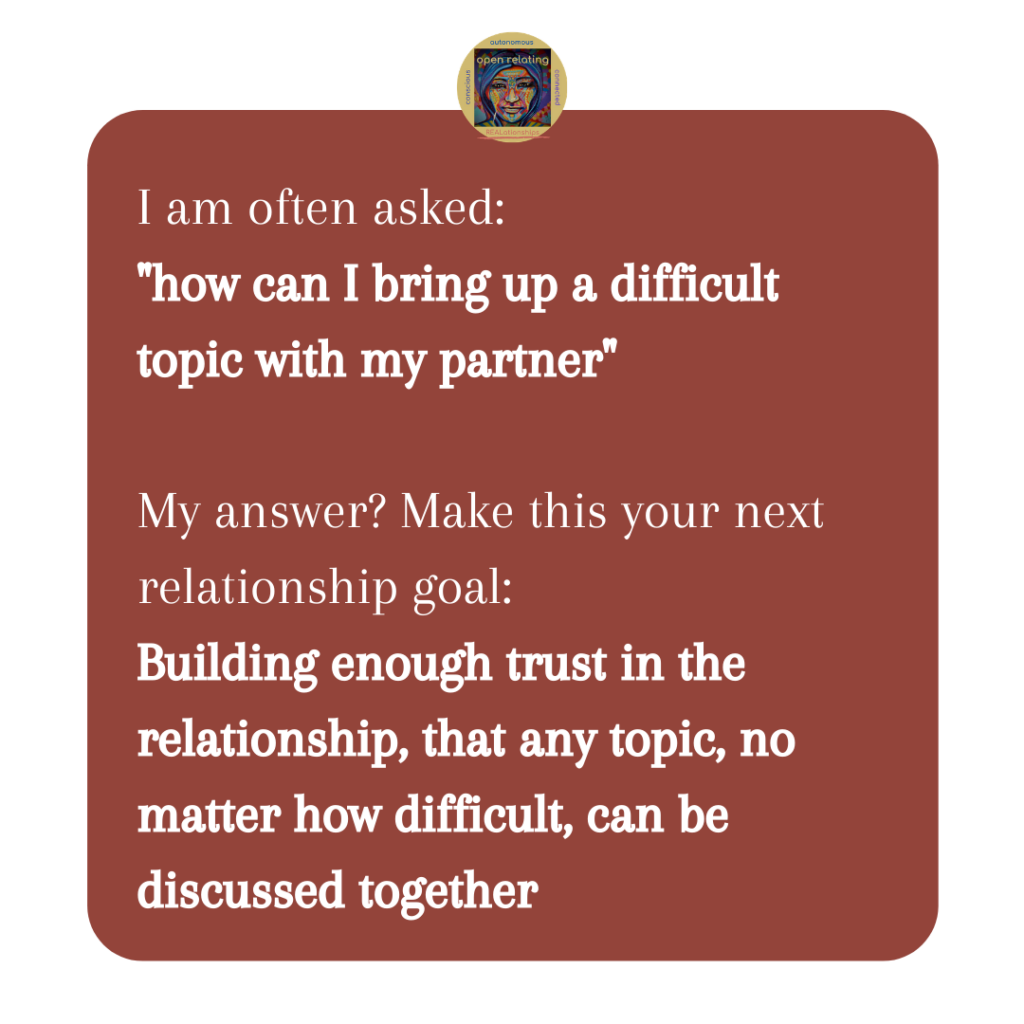
Roy:
I often say to people that I think that it’s good to just take regular periods where you sit down, have a check-in of the relationship and talk, even if it all seems good. It’s good to reaffirm things, and there’s usually something that maybe you didn’t think is important to say.
But if you’re sitting down and you know that the intention is to have the conversation, then hearing things like what you mentioned earlier, “sometimes when you leave your stuff on the floor, it bothers me”, it might be easier to talk about it.
Ryan: One thing we have talked about a lot, is a place where it seems like there would be natural tension. I am quite an independent character, I need a lot of time just by myself to think about stuff. The nature of my work is quite solitary as well. And I think something that came as a surprise to Emma, when I talked about having poly relationships in the past, was that I said the main benefit for me was taking the pressure off, because my partner might have another partner.
I wasn’t the centre of their attention the whole time. I think I’m quite far on the edge of the curve with that thing and it has been a piece of tension in previous relationships. But I think we’ve been talking about it pretty explicitly and navigating it quite well. I think we’re making quite good progress on that, at least as far as I’m concerned.
Emma: Also acknowledging that our relationship has been almost exclusively conducted during the lockdown. We were talking yesterday about how if things change, what that might mean for our relationship?
Roy: Can you share more about that? I think it’s actually pretty important.
Emma: I’m quite a high energy extrovert compared to Ryan. Lockdown is obviously an interesting period, where Ryan is basically the only person I see. So from what you were saying about how you kind of feel that pressure when I’m around, to almost entertain me. In lockdown that’s perhaps more pronounced. Whereas if there were other ways for me to have energy outlets as there would be in normal times, then that would be easier. Now I understand, especially when we’ve been saying yesterday about how often I like to know, what I might be doing for the next couple of hours. That’s just because I want to decide how to best use my time and what I want to do that day. So I would often say to Ryan, what are you doing for the next hour or something, which Ryan interpreted as, “think of something to do, entertain me”.
But all I want to know is, what in your mind is the shape of the day. So I can decide if I should go for a walk or hang out or do some cooking or something.
So that was a useful revelation that we talked about yesterday.
Roy: Do you think that when things get back to normal and you’ll be able to see more people and have more opportunities for socializing, that the shape of your relationship will change?
Ryan: I think I think invariably, yes, I think that relationships are moving targets, even if you don’t want them to be. They always change with time because the people in them change. A lot can happen, so I fully expect it to change. But I think that’s fine. I think you have to accept that and grow into it.
Emma: It might change for the better.
Ryan: Exactly. My experience of previous relationships has been that even if you want to hold on to it tightly forever, you actually come to realize that the whole thing is very fluid. People are fluid. Everybody’s just trying to figure it out as they’re going along. Sometimes things can work well, and then they can get better or they can get worse.
I think that it is dangerous to hold on too tightly to something, when really you should be looking forward and asking, Okay, well, where are we going? What’s next? It should be about where you’re going, not where you’re coming from.
Roy: Emma, So how different is it from previous relationships, your experience, from what I’m hearing, is very conscious in the way you approach this relationship.
Emma: I think that’s been the thing that has made me feel the most secure because of the conversations that we’ve had. I feel like there’s nothing I’m hiding from Ryan. I feel like we’re on the same page. So yeah, I think having that honesty has just made me feel more comfortable and able to enjoy the relationship as opposed to constantly wondering and second-guessing why somebody might be doing something they’re doing.
But also, I think I’m just more mature and have a few more years behind me and a few more experiences and I’ve met different people, I’ve listened to a shit ton of Dan Savage. All of these things are just a learning process. So yeah, that’s just helped me feel like my emotional IQ is just a bit better than it was in previous relationships.
Roy: Amazing. Thank you so much for sharing your story with me.

-
 Initial Consultation (20 minutes)£25 Deposit
Initial Consultation (20 minutes)£25 Deposit


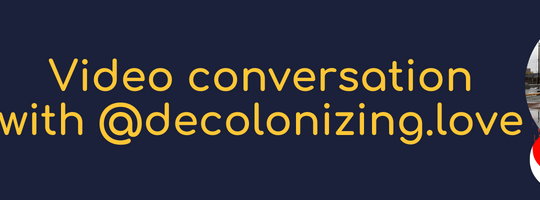
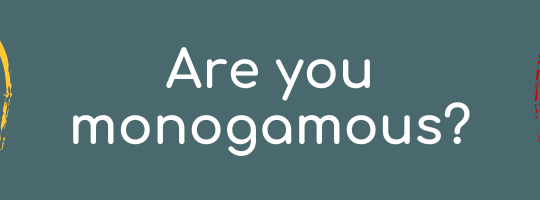


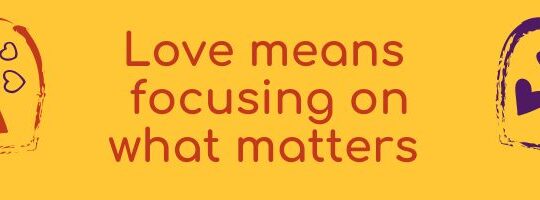

[…] Click here to read part 2 of the interview […]